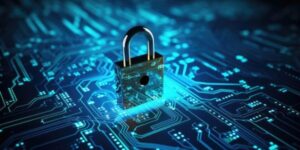27 Jul
In the world of finance, where money flows free,
There’s a need for security, for all to see.
Cyber threats lurk in the digital space,
Waiting to pounce, without leaving a trace.
Banks and institutions, they stand tall,
Guarding our funds, protecting us all.
With encryption and passwords, they lock the gate,
Keeping our data safe from a nefarious fate.

Authentication is key, it’s our secret code,
Ensuring only the right hands hold our financial abode.
Biometrics and questions, they verify our claim,
Making sure our transactions are never the same.
Phishing scams, they try to reel us in,
But we stay alert, we won’t let them win.
We spot the signs, we know what to do,
Protecting ourselves from their deceitful crew.

In this digital world, when transactions get completed by just a click of a button, it is crucial to protect financial data. The security of our financial and personal information is essential, during money transferring, applying for online loan or checking account balance and Cybersecurity provides us that protection.
Cybersecurity is all about providing a protective layer to our money and private data from online attacks. Cybersecurity gives protection to the digital infrastructure comprising of online payment systems, banks, and financial institutions.
The finance industry is most concerned with safeguarding client information. When you open an account with a bank or use a financial service, you provide personal information such as your name, address, social security number, and financial details. Such data is constantly sought by cybercriminals who can use it to carry out such frauds as identity theft or even financial fraud.
To counter these threats, banks and other financial institutions employ diverse cybersecurity measures. For instance, they use encryption techniques to scramble your data into an unreadable format, making it indecipherable to unauthorised users. It’s like sending a secret message in a code that only you and the intended recipient can understand.
Authentication is another vital aspect of cyber security in finance. The computer system has to confirm that it is you and not a fraudster when you login to your online bank account or make a transaction. This normally involves the use of passwords, PINs, biometric identifiers (for example fingerprint or face recognition) or seeking answers for security questions. It’s like using secret code words or actions that only you know to prove your identity to the system.

Furthermore, banks put monitoring systems in place to watch out for any suspicious behaviour. What if your bank suddenly realised some big withdrawals on your account without your permission? They would take this as criminal activity and investigate further in order to preserve your assets. It’s much like having video cameras inside your home detecting weird movements.
There are also many phishing schemes that target the finance sector. This happens when cybercriminals pretend to be real bodies such as government agencies or banks so as to coerce people into revealing their sensitive details like e-banking passwords and credit card numbers. Hence, banking institutions teach clients how to identify phishing scams and always tell them not to share their personal information through suspicious websites and emails on the internet regardless of how genuine they might appear. It’s a bit like being cautious about complete strangers who come knocking at your door requesting you for private information about yourself.

Cybersecurity isn’t just about protecting customer data; it’s also about ensuring the integrity of financial transactions. In the digital world money can be transferred between accounts in seconds. However, this velocity also leaves room for cyber attacks which can manipulate or intercept such transactions.
Thus, banks employ techniques such as transactional monitoring and secure networks to forestall these attacks. They scrutinise all the incoming and outgoing transactions, flagging any unusual activity that deviates from normal patterns. Moreover, they use firewalls and secure communication channels to prevent unauthorised access to their networks. It’s like having money transported safely between places by armoured trucks with guards who ensure nobody intercepts them along the way.
Nonetheless, cybersecurity in the finance industry is a never-ending war. These cybercriminals are always changing their methods of bypassing security checks and taking advantage of vulnerabilities. In consequence, banks need to be on toes and update their cybersecurity protocols regularly so that they can remain relevant with the ever-changing threat landscape.
As consumers we have a role too in cybersecurity. This can be done through good online hygiene where we practice steps such as using strong unique passwords, avoiding suspicious links or emails and keeping our devices up to date among others which will help protect us as well as contribute towards a safer digital environment.
Thus, cybersecurity in the finance sector is essential for maintaining trust and confidence in the digital economy. It’s about keeping our money and personal information safe from cyber threats and ensuring the integrity of financial transactions. Keeping proper information about cyber threats, we can easily safeguard necessary data.

Transactions fly, at the speed of light,
But behind the scenes, there’s a cyber fight.
Monitoring systems, they keep watch day and night,
Flagging any anomalies, keeping our finances tight.
Secure networks, they form a digital fort,
Shielding our data from any cyber onslaught.
Firewalls blaze, like guardians in the night,
Blocking intruders, keeping our assets out of sight.
Cybersecurity isn’t just a task for the few,
It’s a responsibility for me and for you.
With good online habits, we can all play a role,
In keeping our finances safe and whole.
So let’s stay vigilant, let’s stay aware,
And together, we’ll make cyberspace fair.
For in the world of finance, where money’s at play,
Cybersecurity ensures a brighter day.
